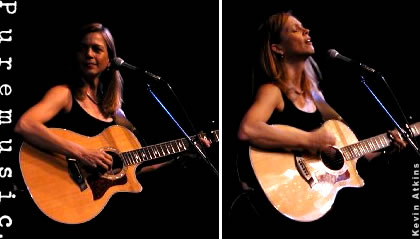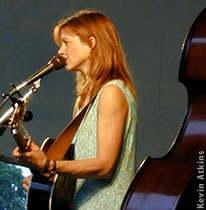
A Conversation with Carrie Newcomer (continued)
CN: The thing that will be a factor is that you can have the best site in the world, but unless people know to go there, they don't go there. They don't know it exists. So there is the machine of letting people know that you exist and this music is available. How do indie artists do that? How do they let people know they exist? I think that's a really important factor that will affect how well that whole system works for us as indies.
The downloading thing, again, has its pros and cons. Now someone can go to iTunes and download individual songs, and there's a part of me that says, "Oh, great, they can choose the songs they like and download them for 99 cents for a song, and it's very affordable." But then again, albums are made as a product in themselves, as an artistic work in themselves, created with the idea that the thing as a whole works as well as just individual songs. And I would hate to have the loss of that creative collection idea.
PM: Yeah. That paradigm is a function of how we grew up, albums as such. But I wonder if as the download becomes more the paradigm, if that concept just starts to morph, kind of--
CN: Well, that may be it. That may be just, that's how I grew up--
PM: Yeah, me too.
CN: --listening to complete albums and discovering the song that's the eighth song that is a real jewel that I didn't really get into until I'd heard the whole album a few times and then discovered it--
PM: Right.
CN: --and then I was like, "Wow! What an incredible song!" That may be an experience that we don't encounter as much if it's more downloading of individual songs. The whole Napster thing--it's not Napster anymore, but file sharing--
PM: Well, yeah, the piracy--no, I don't go for that.
CN: Some artists feel like it's okay, but I think, in particular for indie artists--because most of us, on our tours, album sales are the difference between a tour that goes in the black or in the red. And for most of us, we actually can't tour more. Someone says, "Just tour more." "No, I'm sorry, I did 115 shows with the last album, and then all the touring that went with it. I can't really tour more and have a life."
PM: Right. No, that's plenty of shows for anybody.
CN: And that idea that if we don't sell albums and the record company doesn't put them out, the artist, especially middle range artists, really are stuck in a hard place with that, because they do depend often, for tours, on album sales to make it work.
And then there's just the idea this is what I do. If I had a fish store, you wouldn't walk in and take my fish.
PM: Right.
CN: This is what I do. But it is an interesting phenomenon. And I'm always amazed at the sense of entitlement that people have--"I'm entitled to this music." And I don't feel that way.
PM: It's truly warped.
CN: I think healthcare we're entitled to. We don't get it, but we are entitled to it. And a place for people to live--people are entitled to that. I feel that. But music, it's a creative work. And people can go to the library and get that and take it out and listen to it. But are people entitled to someone else's art?
PM: Yeah, I mean, thinking you can steal somebody's music is akin to the idea that if you see someone with a violin case at a bus stop that you could demand that they break it out and play for you.
CN: It's very difficult, because sometimes I think that it's the artist's voice that's getting lost in that argument. We're hearing from the big record companies, and they have a particular business stake in this, and we're hearing people speaking from a consumer viewpoint, "CDs are expensive," and that take on it, or a feeling of somehow having entitlement. But then I think what's getting lost often is the artist's voice.
PM: Right.
CN: You know, "How long did it take you to write that song, Carrie?" I usually say, "All my life." This is what I do. And this is the work of my heart. This is also how I pay for my daughter's shoes. It's that practical. I really hope that the artist's voice doesn't get lost in all this discussion, that it doesn't become just a matter of business and money, having to do with corporations or a consumer sort of issue. It's not just a consumer issue. It's an issue of: is art worth something? Is it really worth something? Do people who create art, are they valuable, is their work valuable? That's the big question. And we're not hearing that voice often enough, I think, the voice of people who make the art.
PM: So I'll ask you one more question, if I may. Are there things so far unattempted, musical or otherwise, that you would like to try sometime?
CN: Well, it's been interesting. Like I said earlier in the interview, in the beginning I just didn't think this was an option, that I would get to do this thing I love. I feel pretty fortunate that I do get to do what I love. But part of doing that has always been not getting attached to one picture or another. If the only picture I had for being a musician was, "Okay, I need to move to L.A. and become Madonna"--
PM: Right.
CN: --that's only one picture of how people do music. And being open to this idea of following what I love and going where it takes me, there's a certain amount of faith that you put into your art and into--kind of into the cosmos, I guess. And so far, it's really taken me amazing places that I never thought I'd go.
Right now I'm doing a lot of workshops. I teach songwriting and teach creative writing. I'm loving that. That's a somewhat new thing in the last five years. I continue to put out albums with a company that's supporting what I do. I've gotten to work with incredible musicians. I've gotten to travel all over the country and Europe and different places. This is kind of amazing. So I feel I'm open at this point to wherever the next turn takes me, and I try not to have a picture in my head of what that looks like. Because as soon as I get a picture in my head that this is where I'm supposed to go, usually the big cosmic two-by-four goes "Huh-uh."
[laughter]
CN: But just to continue to really push myself and stretch myself musically. This whole new collection of songs from the diner is stretching myself. I'm doing some visual art again that's pushing me; writing things that aren't songs and challenging myself to push that envelope a little bit more; going out and touring again after the longest break I've taken in over ten years, that's pushing me. I guess if I had to say what am I looking for in the future, it's to remain restless, to never get complacent as an artist. I think that will keep my art vibrant, if I always stay restless.
PM: Well, it's been a wonderful conversation. You're really a beautiful person, and it's very nice to meet you.
CN: Well, gosh, thank you. And your webzine is wonderful. Actually, that's one thing Aaron said to me, too, that he was so delighted that you liked the site, and he looked at yours and thought, "Wow, this is pretty cool."
[laughter]
PM: You take care, Carrie. I hope to see you the next time you come through Nashville.
CN: Okay, Frank, that'd be great.
 |
|
| print (PDF) | |
| listen to clips | |
| carrienewcomer.com | |
| rounder records | |
| photographers: | |
| jim mcguire | |
| kevin atkins | |
| puremusic home | |